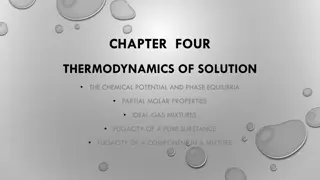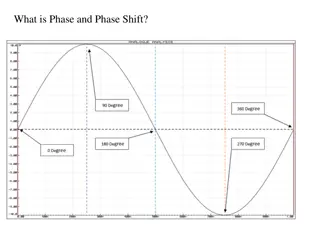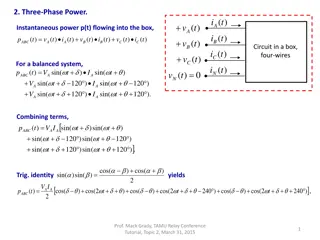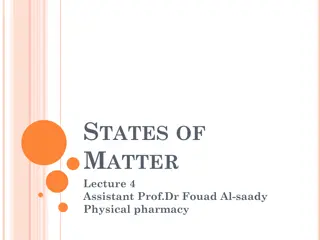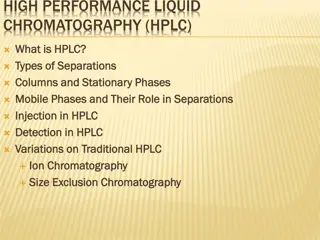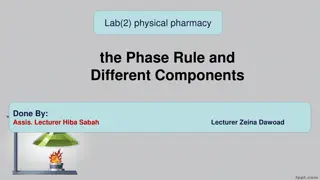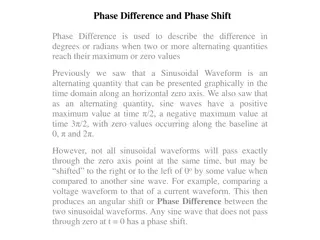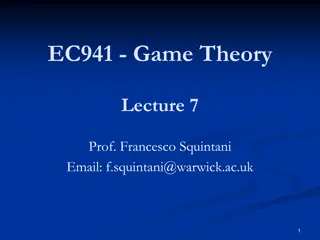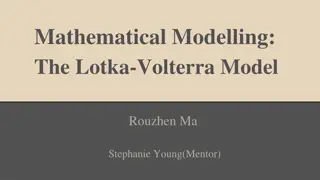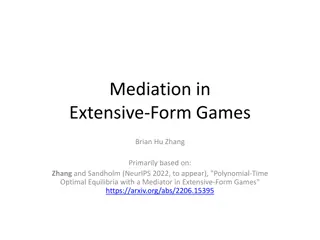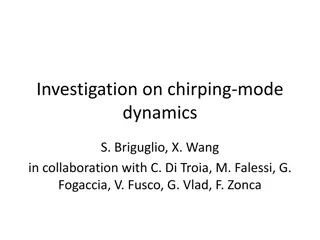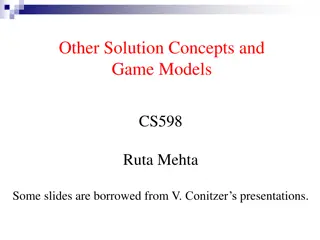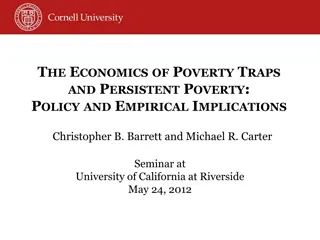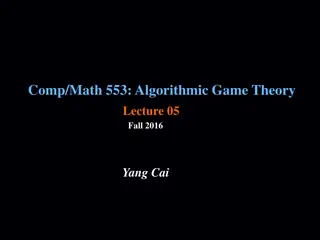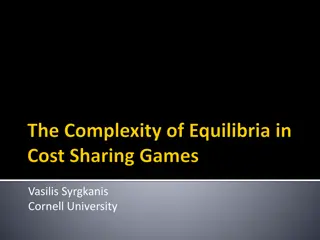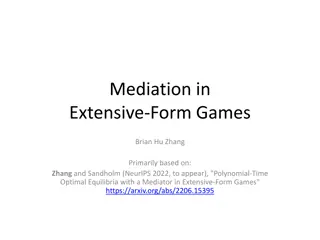Chemical Potential and Phase Equilibria in Solution Thermodynamics
The chemical potential and phase equilibria in solution thermodynamics are crucial concepts for understanding the behavior of mixtures at varying compositions and conditions. By investigating the fundamental property relation, partial molar properties, and the role of Gibbs energy, we can grasp how
9 views • 25 slides
RC Phase Shift Oscillators
Dive into the world of RC phase shift oscillators, exploring the concepts of phase and phase shift in electronic circuits. Learn how cascading RC networks can achieve specific phase shifts, the role of impedance, and the practical applications of RC feedback networks in oscillator circuits. Discover
7 views • 18 slides
Three Stages of Project Life Cycle
The project life cycle consists of three key stages: pre-investment phase, construction phase, and normalisation phase. The pre-investment phase involves objective formulation, demand forecasting, and cost-benefit analysis. The construction phase focuses on building project infrastructure and invest
3 views • 5 slides
Three-Phase Power Systems and Instantaneous Power Flow
This detailed content delves into three-phase power systems, analyzing instantaneous power flow, balanced circuits, and trigonometric calculations. It explores the concept of constant three-phase power and provides insights into the analogy of a piston engine with infinite cylinders. The data includ
15 views • 9 slides
Phase Equilibria in Physical Pharmacy
Delve into the complexities of states of matter, phase equilibria, and the phase rule as explained by Assistant Prof. Dr. Fouad Al-saady in the context of physical pharmacy. Learn about phase definitions, phases in different systems, and examples illustrating phase differentiation in various substan
5 views • 22 slides
An Overview of High Performance Liquid Chromatography (HPLC)
High Performance Liquid Chromatography (HPLC) is a powerful analytical technique used for separating and identifying compounds in a mixture. It involves a mobile phase and a stationary phase to achieve separation based on different physicochemical properties. The mobile phase plays a crucial role in
3 views • 20 slides
The Phase Rule in Physical Pharmacy: Two Component Systems and Equilibrium Phases
The Phase Rule is essential in determining the state of a system based on components and phases. This study explores two-component systems in physical pharmacy, illustrating miscibility behaviors and equilibrium phases through diagrams and explanations. Understanding binodal curves, tie lines, and t
9 views • 12 slides
Econometric Theory for Games: Complete Information, Equilibria, and Set Inference
This tutorial series discusses econometric theory for games, covering estimation in static games, Markovian dynamic games, complete information games, auction games, algorithmic game theory, and mechanism design. It explores topics like multiplicity of equilibria, set inference, and mechanism design
6 views • 23 slides
Phase Difference and Phase Shift in Sinusoidal Waveforms
Phase difference and phase shift describe the angular displacement of sinusoidal waveforms in degrees or radians. These concepts are crucial in analyzing the relationship between alternating quantities such as voltage and current. The phase angle determines the shift of a waveform along the horizont
8 views • 26 slides
Game Theory Lecture 7: Repeated Games and Equilibria
Exploring the concept of repeated games in game theory, this lecture covers infinitely repeated games, Nash and subgame-perfect equilibria, strategies, a Grim Trigger Strategy in the Prisoner's Dilemma, and automaton representation. Understanding how interactions evolve over time offers insights int
3 views • 45 slides
Lotka-Volterra Model in Mathematical Modelling
Explore the dynamics of predator-prey systems through the Lotka-Volterra model, including equilibrium points, behavior around equilibria, linearization, eigenvalue analysis, and classification of equilibria based on real and complex eigenvalues.
5 views • 14 slides
Mediation in Extensive-Form Games: Polynomial-Time Optimal Equilibria
This content discusses the concept of mediation in extensive-form games based on the work of Zhang and Sandholm. It explores correlated equilibria in normal-form games and the role of a mediator in achieving Nash equilibrium among players. Various game scenarios, strategies, and equilibrium concepts
3 views • 46 slides
Learning in Games Seminar
Explore the intersection of Game Theory and Machine Learning in the context of Learning in Games. Discover how decision-makers adapt strategies to maximize their utility, with emphasis on Multi-Agent Learning. Topics include AI for Board Games, Equilibrium Computation in Auctions, and various soluti
3 views • 11 slides
Equilibria in Populations: Hardy-Weinberg Principle
Exploring the concept of equilibria in populations, focusing on Hardy-Weinberg principles and its implications. The discussion covers allele distributions, genotype frequencies, maintenance of equilibrium across generations, and scenarios where equilibrium may be violated. Key points include basic p
0 views • 58 slides
Chirping Mode Dynamics in Tokamak Equilibria
Chirping Alfvén modes in Tokamak equilibria exhibit frequency variation, allowing for maximizing power extraction from fast particles. Investigation of a chirping mode with Hamiltonian-Mapping and analysis of relevant phase-space slices reveal insights into the dynamics, resonance, and density grad
3 views • 41 slides
Nutritional Treatment Phases in Pediatric Malnutrition
This session covers the different phases of nutritional treatment in pediatric malnutrition programs, focusing on objectives, specifics, and criteria for transitioning between phases. An illustrative case of Annika, a 3-year-old in the Transition Phase, is provided for practical application and unde
4 views • 5 slides
Game Theory Concepts and Models in Strategic Decision-Making
Exploring various solution concepts and game models in the realm of game theory, this presentation delves into topics such as Nash equilibrium, dominance, dominant strategy equilibrium, mixed strategies, and iterated dominance. It discusses how players decide on particular equilibria, possible solut
0 views • 39 slides
Advanced Imaging Techniques for Three-Phase Flows in Reactor Systems
Gas-liquid-solid reactor systems require advanced measuring techniques to understand complex three-phase flows. Multi-Phase Flow Decomposition using Electrical Capacitance Volume Tomography (ECVT) offers innovative solutions for visualizing and quantifying phase hold-up distributions and dynamic cha
4 views • 17 slides
The Economics of Poverty Traps and Persistent Poverty
Persistent poverty poses a significant development concern, with appropriate policy responses depending on causal mechanisms such as slow growth, unique poverty equilibria, or avoidable traps. Various mechanisms contribute to poverty persistence, requiring careful theorizing and empirical analysis.
7 views • 14 slides
Algorithmic Game Theory: Nash Equilibria Algorithms
This content delves into the computational complexity of finding Nash equilibria in games, exploring support enumeration algorithms and their implications for two-player and n-player games. It covers the concepts, theorems, and algorithms involved in Nash equilibrium computation, highlighting the ch
3 views • 22 slides
Solubility Equilibria
In the realm of chemistry, solubility equilibria play a crucial role in determining the extent to which ionic compounds dissolve in water. This equilibrium concept allows us to quantify the relative solubilities of different compounds through solubility product constants. Explore the solubility expr
3 views • 40 slides
Efficient Computation of Pure Nash Equilibrium in Game Theory
This content discusses the computational complexity of finding Pure Nash Equilibria in game theory, focusing on different scenarios and algorithms. It explores the challenges and solutions related to computing Pure Nash Equilibria efficiently in various types of games.
3 views • 33 slides
Acid-Base Equilibria Jeopardy Review
Test your knowledge on acid-base equilibria with this interactive Jeopardy review worksheet. Explore properties of acids, neutralization reactions, definitions of acids and bases, and more. See if you can answer the questions correctly and check your solutions for each question.
3 views • 59 slides
Module 1: Acid-Base equilibria
The concepts of acid-base equilibria, buffer solutions, pH control, and buffer preparation in Chemistry. Learn about the biological relevance of buffers, different buffer systems, and characteristics of buffers. Dive into understanding concentrations in buffer solutions and the dissociation of acids
4 views • 9 slides
Game Models and Solution Concepts Overview
Various game models and solution concepts including dominance, correlated equilibria, Stackelberg equilibria, and more. Delve into prisoners' dilemma, dominance by mixed strategies, checking for dominance, and iterated dominance in game theory.
6 views • 56 slides
Equilibria of Other Reaction Classes: Precipitation, Solubility, and Ksp
In this chapter, delve into the world of equilibria involving precipitation, dissolution, and the solubility product constant, Ksp. Explore the concept of solubility equilibrium, understanding sparingly soluble compounds, interpreting solubility expressions, and calculating Ksp values. Discover how
1 views • 37 slides
Crystallization Principles and Equilibria in Chemical Engineering
Discover the fundamentals of crystallization in chemical engineering, covering topics such as the formation of solid particles, crystal purity, crystal size importance, equilibria, and more. Gain insights into the principles behind obtaining pure chemical substances through crystallization processes
3 views • 40 slides
Optimal Equilibria with a Mediator in Extensive-Form Games
Explore the concept of mediation in extensive-form games based on the study by Zhang and Sandholm, focusing on finding correlated equilibria in normal-form games through a mediator's strategic interventions. Learn about strategies for mediators and players to achieve Nash equilibrium in game scenari
3 views • 46 slides
Semester 2 Physical Chemistry: Liquid-Liquid Equilibria & More
Dive into Physical Chemistry with a focus on liquid-liquid equilibria, phase diagrams, Raoult's Law, ideal solutions, and more. Explore concepts such as miscibility and ternary diagrams in this advanced course under Instructor Rama Oktavian.
2 views • 41 slides
Physical Chemistry: Liquid-Liquid Equilibria & Ternary Diagrams
The intricacies of liquid-liquid equilibria with a focus on miscibility, solubility, and ternary diagrams in Physical Chemistry. Delve into topics like Raoult's Law, phase diagrams, and solution chemistry under the guidance of Instructor Rama Oktavian.
2 views • 23 slides
Advanced Equilibrium Concepts in Chemistry: Lecture Highlights and Systematic Approaches
Explore advanced equilibrium topics discussed in today's chemistry lecture, including the failure of the ICE method with two equilibria, the systematic method with its six steps, and the challenges of weak acid equilibria. Discover the importance of utilizing a systematic approach in solving complex
17 views • 15 slides
Acid-Base Equilibria in General Chemistry
Explore acid-base equilibria concepts in general chemistry, covering topics such as autoionization of water, equilibrium constants of acids and bases, strong and weak acids, and more. Understand the behavior of different substances in solution and the relationship between Ka and Kb values.
17 views • 14 slides
Acid-Base Equilibria in General Chemistry
Explore the concepts of acid-base equilibria, common bases, oxoanions from oxosalts, amphoteric substances, concentrations in equilibrium, and Lewis acids/bases in the realm of General Chemistry. Understand the characteristics of various bases, naming conventions for oxoanions, identification of amp
1 views • 9 slides
Acid-Base Equilibria and Electrolytes Overview
Explore acid-base equilibria principles, definitions, conjugate pairs, and the concept of electrolytes in aqueous solutions. Identify different types of acids, bases, and their properties. Understand the relationship between acids, bases, and water interactions.
13 views • 14 slides
Understanding Acid-Base Equilibria in General Chemistry
Explore Module 13 on acid-base equilibria in General Chemistry (Chem2331) covering pH scales, concentration calculations, solutions ranking, and pH of salts with approximate ranges. Dive into videos, formulas, and fast approximations for deeper comprehension.
5 views • 8 slides
Aqueous Equilibria: Explore Aspects and Applications in Chemistry
Dive into Chapter 17 of AP Chemistry 2019 covering additional aspects of aqueous equilibria. Topics include the common ion effect, buffers, titrations, solubility equilibria, precipitation, and separation of ions. Understand concepts such as how buffers resist pH changes and the common ion effect's
1 views • 16 slides
Understanding Acid-Base Equilibria in General Chemistry II
Explore acid-base equilibria in General Chemistry II with modules covering strong acids with strong bases, titration techniques, pH calculations, equilibrium constants, and important magnitudes. Learn to predict pH changes, interpret titration curves, and solve concentration problems effectively.
1 views • 12 slides
Additional Aspects of Aqueous Equilibria in Chemistry 1212 with Dr. Aime Tomlinson
Explore the common-ion effect and buffer solutions in Chapter 17 of aqueous equilibria. Learn how common ions impact equilibrium shifts and discover the role of buffer solutions in maintaining pH stability. Dive into examples and the Henderson-Hasselbalch equation to enhance your understanding of th
4 views • 39 slides
Exploring Aqueous Equilibria: Chapter 17 Highlights and Examples
Discover the key topics of Chapter 17 on Additional Aspects of Aqueous Equilibria in AP Chemistry 2019, including the Common Ion Effect, Buffers, Titrations, Solubility Equilibria, and more. Dive into examples and explanations to deepen your understanding of these essential concepts.
0 views • 16 slides
Metal Complex Stability: Factors, Equilibria, and Formation Constants
Explore the stability of metal complexes in solution, including stepwise and overall formation constants, factors influencing stability, and methods for determining stability constants. Learn about coordination complexes, ligand-metal equilibria, and the distinctions between stability and reactivity
3 views • 31 slides
